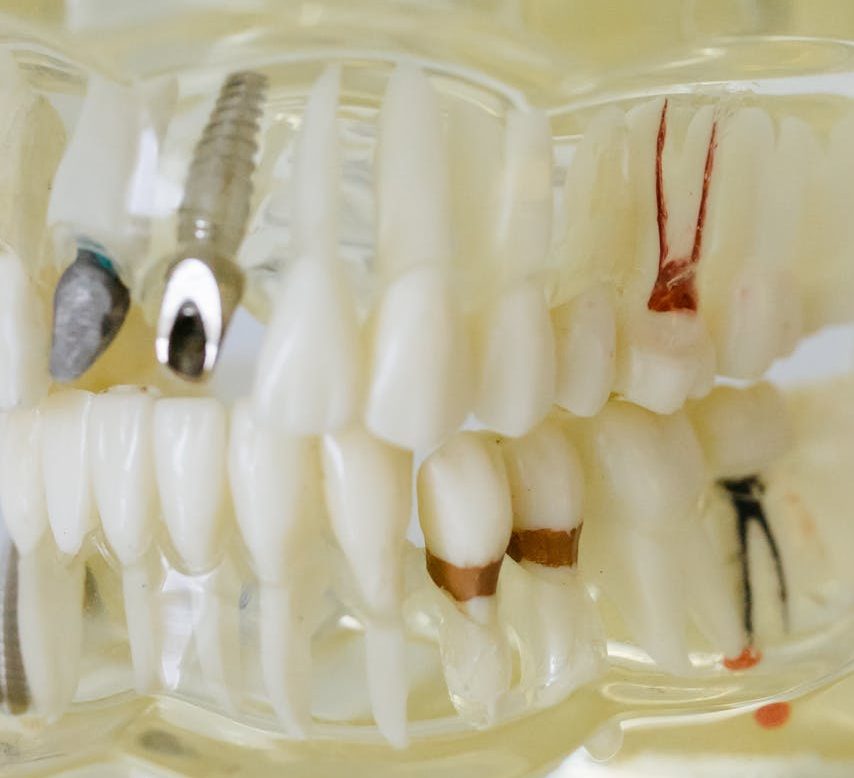
One of the biggest differences between dentures and dental implants is how they are used. Dentures are removable prosthetics designed to replace missing teeth. They can be taken out for cleaning and at night. On the other hand, dental implants are permanent. They are surgically placed into the jawbone, acting as artificial tooth roots, and are intended to remain in place for life, providing a more permanent solution to missing teeth.
Dentures offer flexibility, but dental implants offer permanence and long-term stability.
Dentures sit on the gums, while implants are anchored to the jaw
Dentures rest on the gums and are typically held in place with adhesive or natural suction. They can be adjusted or removed by the patient as needed. Dental implants, however, are surgically placed into the jawbone, where they fuse with the bone through a process called osseointegration. This anchoring gives dental implants the feel and function of natural teeth, making them more stable and secure compared to dentures.
Dental implants are anchored in the jaw, providing better support than removable dentures.
Dentures are less expensive initially, but implants offer long-term savings
Dentures typically have a lower initial cost compared to dental implants. However, dentures often need to be replaced or adjusted over time as the mouth changes and wear occurs. Implants, while more expensive upfront, can last a lifetime with proper care, reducing the need for replacements and offering long-term savings in the end.
Although dentures are cheaper initially, dental implants may be more cost-effective in the long run.
Implants preserve bone structure; dentures do not
Dental implants help preserve bone structure in the jaw by stimulating the bone, just like natural tooth roots do. This process helps prevent bone loss, which can occur when teeth are missing. Dentures, however, do not provide this benefit. Over time, the jawbone may shrink due to the lack of stimulation, which can change the fit of the dentures and affect facial appearance.
Implants help maintain bone health, while dentures do not prevent bone loss over time.
Dentures can affect taste and comfort, while implants feel more natural
Because dentures cover the gums, they can sometimes interfere with taste and feel bulky in the mouth. The adjustment period can also be challenging, especially when it comes to eating and speaking. Dental implants, however, feel more like natural teeth and do not impact taste or comfort. Since they are securely placed in the jaw, they provide a more natural fit and function, allowing you to eat, speak, and smile without discomfort.
Dental implants offer a more comfortable and natural feeling than dentures.
Dentures need more maintenance than implants
While both dentures and implants require care, dentures need more maintenance. They must be removed and cleaned regularly to avoid bacteria buildup. Dentures may also need to be relined or replaced as the shape of the mouth changes. In contrast, dental implants require standard oral hygiene, including brushing and flossing, but they do not need to be removed or replaced as frequently as dentures.
Implants require less maintenance than dentures, which need regular adjustments.
The choice depends on individual needs and preferences
The decision between dentures and dental implants ultimately depends on your oral health, budget, and personal preferences. Dentures are a good option for individuals who need an affordable solution for replacing missing teeth. They are also a great choice for people who may not have enough bone density for implants. Dental implants are a better option for those who want a permanent, natural-feeling solution and are willing to invest in the long-term benefits.
Each option has its pros and cons, so it’s important to consult with your dentist to find the best solution for your needs.
